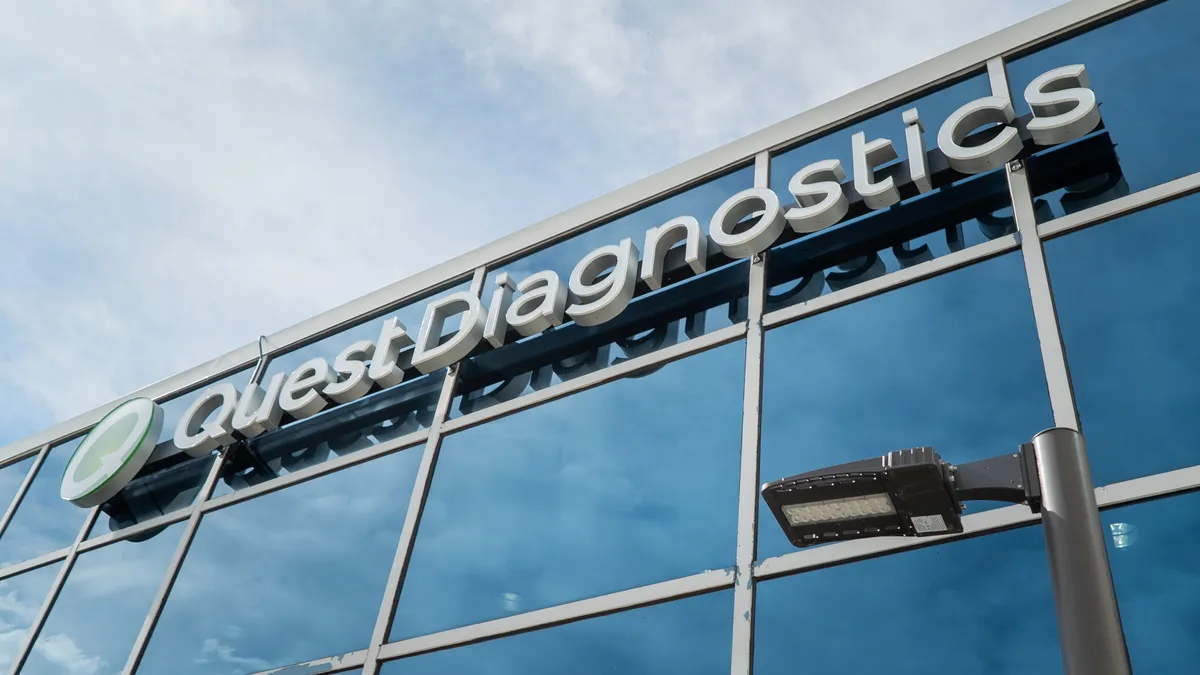UPDATE: July 21, 2020: Quest Diagnostics said in an update on COVID-19 testing capacity late Monday that demand in the South, Southwest and West continues to challenge its average turnaround time for test results but "the inflow of specimens to our labs has stabilized, at a high level, compared to last week, due to our efforts to modulate orders for lower risk patients."
The company reaffirmed that for most patients the average turnaround time for results remains seven or more days, but that there may be significant variability, with some customers receiving results in two or three days and some having to wait as long as two weeks. In a change from last week, Quest said its "priority 1" patients, or those considered critical, are now having to wait an average of more than two days for results, double the one-day wait time reported a week ago.
By comparison, LabCorp reported Sunday its average wait time for results had dropped from four to six days to three to five days.
Dive Brief:
- Quest Diagnostics late Monday reported that demand for COVID-19 molecular diagnostic testing continues to soar across the country, resulting in further elongated turnaround times for test results.
- The commercial lab giant said demand for its coronavirus diagnostics, particularly in the South, Southwest and West, are outpacing its capacity. As a result, non-priority patients face average wait times for their test results of seven or more days. In rival LabCorp's most recent update given last week, it estimated its current wait time to be four to six days, the same as Quest at that time.
- Quest on Monday cited pre-operative patients undergoing procedures in U.S. hospitals and surgery centers as one key factor contributing to the spike in testing demand and resulting delays, warning that the situation will not improve as long as the virus continues to spread nationwide.
Dive Insight:
Despite their efforts to rapidly increase testing capacity, commercial labs such as Quest and LabCorp have been struggling to keep up with the growing demand for COVID-19 molecular tests as coronavirus cases and hospitalizations continue to rise sharply in some parts of the country.
Quest's latest update called out "specific drivers" for the soaring demand for diagnostic tests including: pre-operative patients undergoing procedures in hospitals and surgery centers; high-risk populations, such as those receiving care in federally qualified healthcare centers, nursing homes and correctional facilities; and individuals seeking testing from community drive and walk through events.
To help alleviate demand, Quest asked healthcare providers to limit the number of test specimens they send to the company to patients who are low risk.
"We want patients and healthcare providers to know that we will not be in a position to reduce our turnaround times as long as cases of COVID-19 continue to increase dramatically across much of the United States. This is not just a Quest issue. The surge in COVID-19 cases affects the laboratory industry as a whole," the company said.
The American Clinical Laboratory Association, which represents LabCorp, Quest and other labs, warned that its members have seen a steady increase in the volume of COVID-19 test orders which are outpacing their testing capacities.
“In light of the ongoing spread of the virus in states across the country, many labs are now receiving more test orders than they are able to process in a single day. We have urged ordering providers to follow CDC guidelines for ordering COVID-19 testing, and while labs are working around the clock, we anticipate continued shortages of the supplies and equipment necessary for molecular COVID-19 testing,” ACLA President Julie Khani said in a statement emailed to MedTech Dive on Tuesday.
In recent weeks, as orders for diagnostic services have increased and outpaced availability, both Quest and LabCorp have reported slowdowns in the time it takes their labs to deliver test results.
"Until recently, we have been able to deliver test results back to patients on average between 1-2 days from the date of specimen pickup. But with significant increases in testing demand and constraints in the availability of supplies and equipment, the average time to deliver results may now be 4-6 days from specimen pickup," LabCorp advised in a July 8 statement.
As of last week, LabCorp said it is able to process more than 130,000 tests per day and plans to increase its capacity to 150,000 tests per day by the end of July.
Similarly, Quest said Monday it's able to perform up to 125,000 molecular diagnostic tests a day, about twice what its testing capacity was eight weeks ago, and by the end of July expects to increase to 150,000 molecular diagnostic tests a day. However, the company said its ability to add capacity is restricted by ongoing global supply chain constraints for testing materials.
"While our suppliers of test platforms and reagents continue to be responsive to our need to add capacity, they are limited amid surging demand in the United States and globally," Quest said in Monday's statement.
Likewise, LabCorp said its ability to expand testing capacity and reduce turnaround times for results is contingent on "additional equipment and supplies becoming available."
Although Quest is finding it impossible to fully keep up with U.S. demand for coronavirus diagnostics, there are silver linings. The company early Monday reported preliminary second quarter revenues of about $1.83 billion, a better-than-expected 6% decline from the year prior. The company attributed the results to a recovery in its routine testing business as well as rising COVID-19 testing demand.
Quest is scheduled to disclose its full second quarter earnings on July 23, while LabCorp is slated for July 28.










